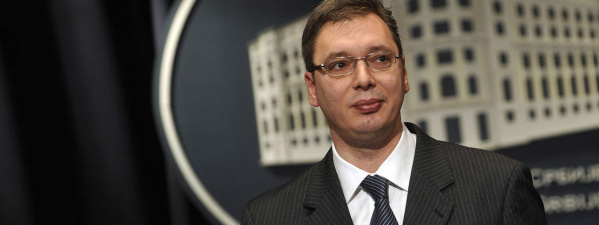
Vucic: IMF negotiations won't be hampered
Serbia is ready to start talks with the International Monetary Fund on a new program next month and wants to resolve possible obstacles to the talks, Deputy Premier Aleksandar Vucic said.
The government, reshuffled in September, expects to receive a letter from the IMF on a negotiation mission "today or tomorrow" and its answer will be that "we are willing to discuss the program," Vucic said in an interview in Belgrade today. The unprofitable state-run gas company Srbijagas JP with its debts of about 1 billion euros ($1.38 billion) is a burden on public finances and the government is working to resolve it, so that it doesn't hinder IMF talks, he said.
"We have been working closely with the IMF since October and we are now in a position to start the program discussions," Vucic said. "We'll be open about the problems that we have. Talks can start as soon as possible, in February, I hope."
Serbia is looking for a precautionary program with the Washington-based lender to support its planned reforms, convince investors that it is safe and stable for investment and open access to cheaper funding, Vucic said. The IMF suspended talks in February 2012 after the government failed on its budget commitments and has refused to resume talks since then. The Balkan country will open accession talks with the European Union on Jan. 21, which will help boost investment.
"We are now at a point of no return," Vucic said. "I hope that after Jan. 21, when we tick another box, that will be a clear signal to people from EU countries to come and invest."
Strauss-Kahn
Serbia hired Dominique Strauss-Kahn, a former IMF chief, as adviser to help overhaul the economy and improve ties with the Fund. Strauss-Kahn has also encouraged the government to find solutions for RTB Bor, Serbia's sole copper miner, Vucic said. The government is now "urgently" seeking solutions for 800 million worth of sovereign-backed borrowing by Srbijagas, which the company cannot service.
Prime Minister Ivica Dacic's Cabinet wants to bring to an end decades of failed effort to sell to private investors companies that have cost the state budget about 750 million euros a year to keep afloat. The government will seek buyers or partners for at least 153 companies with 58,000 workers in 2014, to avoid closing them, which would fuel unemployment in a country where one in four is out of work.
Germany's Mercedes-Benz is expected to start cooperation with at least one Serbian bus plant by March. Talks have also been underway with Ferrero chocolate manufacturer on agriculture investments, Vucic said.
Snap Election
IMF negotiations won't be hampered should early parliamentary elections take place, said Vucic, who is also the president of the Serbian Progressive Party, part of which is seeking an early ballot in an effort to win a majority. The party leads in opinion surveys with 45 percent of voters according to a poll conducted by Ipsos Strategic Marketing Nove. 21-25 among 1,000 people. Serbia's population is 7.2 million.
"I have made no decision about the elections," said Vucic. "There are many reasons why we have made no decision on elections."
A snap vote would delay access to $500 million in loans from the World Bank, which will support Serbia's budget, health system and cadastre reform. Regular elections are due in 2016.
The 2014 outlook may be tough for Serbia, but its borrowing costs "will certainly not be higher" and economic "growth will be at least one percent" driven by further expansion in car industry, agriculture and food-processing as well as a halt in construction industry declines," Vucic said.
By Gordana Filipovic
Dec. 18 (Bloomberg)

